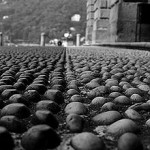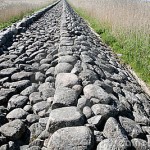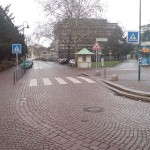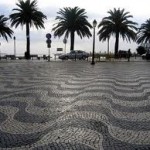Although paving stone roads originally came from Egypt over 5000 years ago, they wasted no time immigrating to virtually all countries of the world. Old fashioned paved streets can still be seen today in many cities of the world, standing the test of time.
Today we take a look within and beyond our borders, across the pond to see the paved streets of the world.
Cobblestone
The pre-cursor to what you would normally consider a paving stone road, cobblestone distinctly has round stones mortared together. Protruding up several inches they make for a very bumpy surface indeed.
 They made their debut on the world stage in the 1700s but were quickly phased out and replaced with more smooth and practical ‘granite setts’ in the late 1800s; (so much so that it is rare indeed to find an old cobblestone road in modern times).
They made their debut on the world stage in the 1700s but were quickly phased out and replaced with more smooth and practical ‘granite setts’ in the late 1800s; (so much so that it is rare indeed to find an old cobblestone road in modern times).
(Right) Small and rather uniformly sized cobblestones in Italy. The theory behind this shape and pattern is improved traction for horses.
 (Right) Large, coarse cobblestone road.
(Right) Large, coarse cobblestone road.
Granite Setts (Belgian Block)
Often mistaken for cobblestones, granite setts are quarried, cut and shaped to whatever specification desired. Granite setts are mortarless and are set with sand; as opposed to cobble stones which are simply round natural stones set in mortar.
 Unlike cobblestones, roads made out of granite sett are still found throughout the world, especially in a larger city’s ‘old’ or ‘historical’ district. However not all Belgian Block roads are from the days of old. Many municipalities (especially those in Europe) actively build new roads in Belgian Block, in order to achieve an atmosphere of old world charm.
Unlike cobblestones, roads made out of granite sett are still found throughout the world, especially in a larger city’s ‘old’ or ‘historical’ district. However not all Belgian Block roads are from the days of old. Many municipalities (especially those in Europe) actively build new roads in Belgian Block, in order to achieve an atmosphere of old world charm.
Belgian Block roads have also gained a reputation for various bicycle races in France, as being the most difficult and pivotal point of the race (due to the difficulty of cycling on their surfaces)
 Possibly the most creative applications of Belgian Block can be found in far off Lisbon, Portugal, where you can throw a stone without encountering some for of aesthetic paver sidewalk, street or square.
Possibly the most creative applications of Belgian Block can be found in far off Lisbon, Portugal, where you can throw a stone without encountering some for of aesthetic paver sidewalk, street or square.
